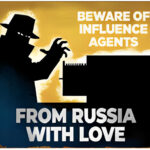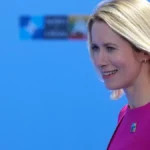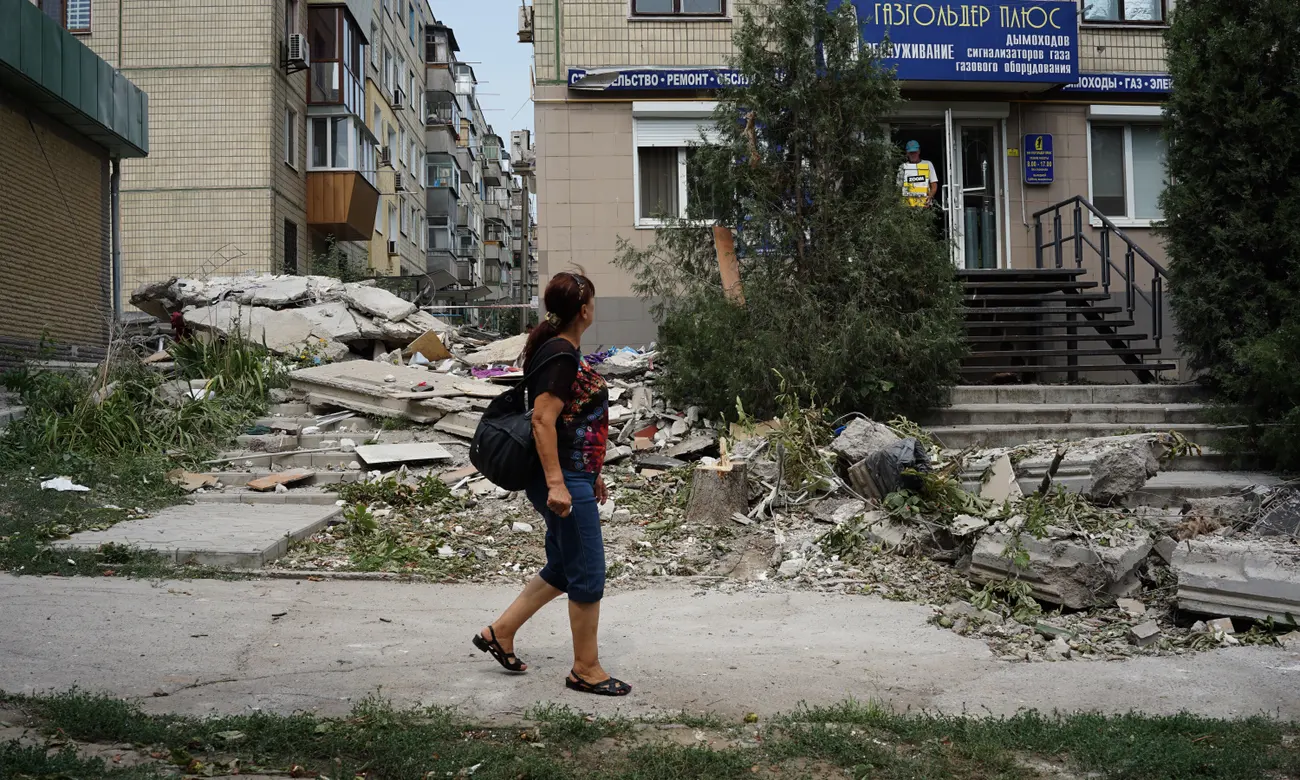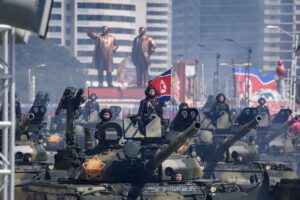
Balakliia’s only functioning shop was packed. Residents who had spent six months under Russian occupation queued to buy bread, salami and frozen mackerel. “When the Russians arrived I lost 10 kilograms. My wife lost eight kilograms. There was almost nothing to eat for the first two months,” one customer, Valery, recalled. Showing off his reduced waistline, he joked grimly: “That’s the upside of Moscow rule.”
Russian troops came to Balakliia in March. This was soon after Vladimir Putin’s invasion. They raised a Russian tricolour above the modern brick town administration building, and parked their tanks in a sprawling factory. Two weeks ago the Ukrainian army chased them out in a dramatic counter-offensive. Kyiv reclaimed almost all of the Kharkiv region, an area half the size of Wales.
The Kremlin had been planning to hold a sham referendum in north-eastern Ukraine, with its pine forests and sunflower fields. As it is, the “vote” is being conducted this weekend in the areas Russia still occupies. They include most of the southern Kherson region, a mere third of Zaporizhzhia oblast, and large chunks of Luhansk and Donetsk, two eastern provinces partly run by Russia and its proxies since 2014.
Over the summer Russia’s presidential administration paused preparations to carry out pseudo-votes on Ukrainian territory. This was because of a lack of support. They were hastily revived last week after the Russian army’s stunning military setbacks. Putin has responded by announcing a partial mass mobilisation at home, designed to recruit up to a million men for his floundering campaign.
Next week Putin will announce the “results”. To the surprise of no one, they will show an overwhelming mandate for these new territories to join with Moscow. The United States, the European Union and indeed the democratic world have condemned the exercise as illegal and meaningless, not least because many inhabitants have fled. And also ridiculous – with faux voting in the middle of a large and thunderous battle.
Nevertheless, the referendum allows Putin to redefine what is in essence a 19th century-style war of imperial conquest. It is being recast as a defensive operation, patriotic in nature, and essential to protect a now bigger motherland from external attack. Thrown in is a threat to unleash nuclear weapons on Ukraine and possibly its western backers, should Volodymyr Zelenskiy’s government try to take back new “Russian” lands.
The Ukrainians have reacted calmly to Putin’s latest gambit. Zelenskiy’s senior adviser Mykhailo Podolyak described the election as a ludicrous “propaganda show”, aimed solely at Russian TV viewers. Its objective was to boost support for “Z-mobilisation”, he said, at a time when thousands of men of military age have been scrambling to exit the country, booking flights out, and lining up at the borders with Georgia and Finland.
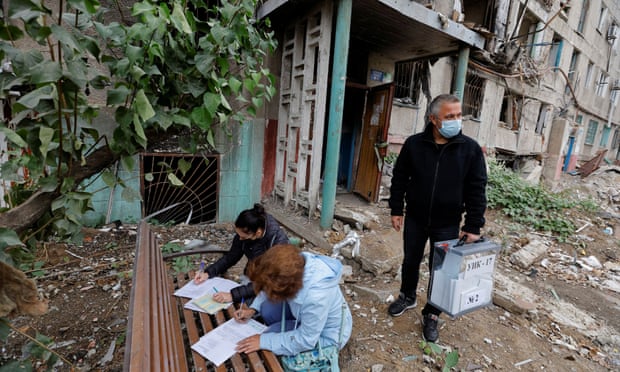
Residents in Balakliia told the Observer that Moscow had been carefully plotting the “referendum” for some time. With little in the shops, and no way of withdrawing cash, the town’s 15,000-strong population was forced to rely on Russian handouts. Humanitarian aid was available. But there was a catch: to receive it, locals had to give their address, and to hand over their passports and Ukrainian identification number.
“They photocopied everything. It was a ploy to get hold of your personal data,” Valery explained. “In return you got a packet of spaghetti and some tinned beef.”
Russia’s FSB spy agency was thus able to put together a highly accurate list of citizens in occupied communities – which could then be used for election manipulation, and for other purposes. “Russia has plenty of experience dating back to Stalin of falsifying its results,” Valery observed.
He added: “Putin knows he’s a war criminal and is trying to hold on to his throne. That’s why he’s done mobilisation. He doesn’t believe Ukraine is a state and he wants to ‘de-nation’ us.” Was Russia’s leader mad? “Something like that. I’m hoping for a coup. He needs to be judged by God and man,” he said. “There’s a special place in hell for him. He reminds me of Louis de Funès, the French comedian who made funny faces.”
Around the corner from Balakliia’s pink-painted shop was a large crater left by a Grad missile. It landed in May next to a five-storey building on Sobornaya street, previously named after Lenin. Alexander Bayev, a pensioner who lives in the block, said the explosion killed his 65-year-old neighbour Vasily, who had been sitting outside on a wooden bench.
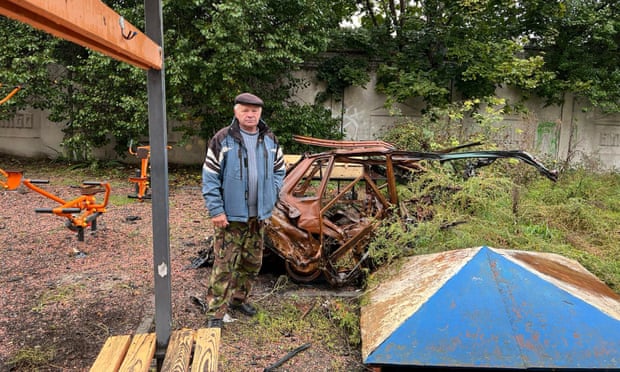
“He staggered to the entrance but didn’t make it,” Bayev said, pointing to blood on the steps. The blast blew out windows from all surrounding apartments, shredded balconies and flipped a car into a children’s play area. Only 15 residents were left, he said, out of 250-odd from before the war. He said he wasn’t much looking forward to winter. “We are Ukrainians, not Russians,” he stressed. “I hope Putin croaks. His guys came and destroyed everything.”
By the time Balakliia was liberated, Russia’s project in what you might call state-building was well advanced. A weekly pro-Putin newspaper, Kharkov Z, was handed out to residents, using the Russian spelling of Kharkiv. A front-page photo showed a Moscow official touring a bread factory. A 14-year-old pupil, Maxim Borisenko, said his teacher told him his classes from September would be taught using a new Russian curriculum.
Despite these propaganda measures, local support for annexation was extremely limited, residents said. “When our boys came we celebrated with champagne. I had hidden a bottle for that moment,” Natalia Sergeyevna recounted. “If the enemy had made us take part in a referendum I would have spoiled my ballot paper. No one here wants Russia.” What would happen now? “Our president is clever. We will take everything back,” she predicted.
Voting in the sham referendum started on Friday. Video showed Russian soldiers in balaclavas escorting “election” workers carrying ballot boxes. According to Telegram posts from Russian-controlled towns, officials have been going from house to house, coercing some people into voting. They have targeted the elderly who have received Russian pensions, as well as anyone who signed up for humanitarian goods.
Serhii Haidai, head of the Luhansk region’s military administration, said the poll was a farce. There was no confidentiality, with paperwork filled out in the open in homes and yards, he said. If residents refused to open their door, “commissioners” threatened to break in. The names of those who vote “no” are recorded in a notebook, he said, with the exercise used as a pretext to identify men of military age.
Russia’s next apparent terror tactic is to conscript Ukrainians in occupied areas to fight against their own army. In his latest address Zelenskiy urged men to sabotage Putin’s war effort from inside, if drafted, or to flee to government-controlled areas. This is almost impossible. From early summer months only women were allowed to leave Balakliia, via a crossing at Pechenihy reservoir, some 70km away.

Currently Balakliia has no electricity or gas. Andriy, a Ukrainian soldier, went to the town’s train station on Saturday to recharge his phone from a public generator, available for four hours a day. He said he and his regiment would carrying on fighting, regardless of the “result” or whatever Putin did next. “Our task is to free our territory. We will gradually kick the Russians out. I’m certain of it,” he said.
In the meantime, there is little prospect the war will end soon. Kyiv has made it clear it will not negotiate if Moscow annexes vast areas of eastern and southern Ukraine. It has promised to restore the country’s sovereign borders. That includes Crimea, the peninsula that Russia stole in 2014, and where ethnic Tatars known for their pro-Ukrainian views are now being cynically drafted.
Ukrainian citizens who do vote for annexation – for whatever reason – can expect a reckoning. One Balakliia pensioner, Lionia, said he was a diabetic. When his insulin ran out he asked the Russians for help. “When I collected the medicine they took my photo and put it in their swine paper. Then they left. My neighbours came round and beat me and my wife up,” he said, adding unhappily: “What choice did I have?”
On Saturday Ukrainian soldiers were making further gains. They were close to the city of Liman in Donetsk oblast, and were advancing slowly but surely towards the southern regional capital of Kherson, the target of another counter-offensive. More than ever following this month’s successes, they believe in victory. “Yes, Russia is a colossus. But look at its feet. They are made of clay,” Valery said.
Source: The Guardian



